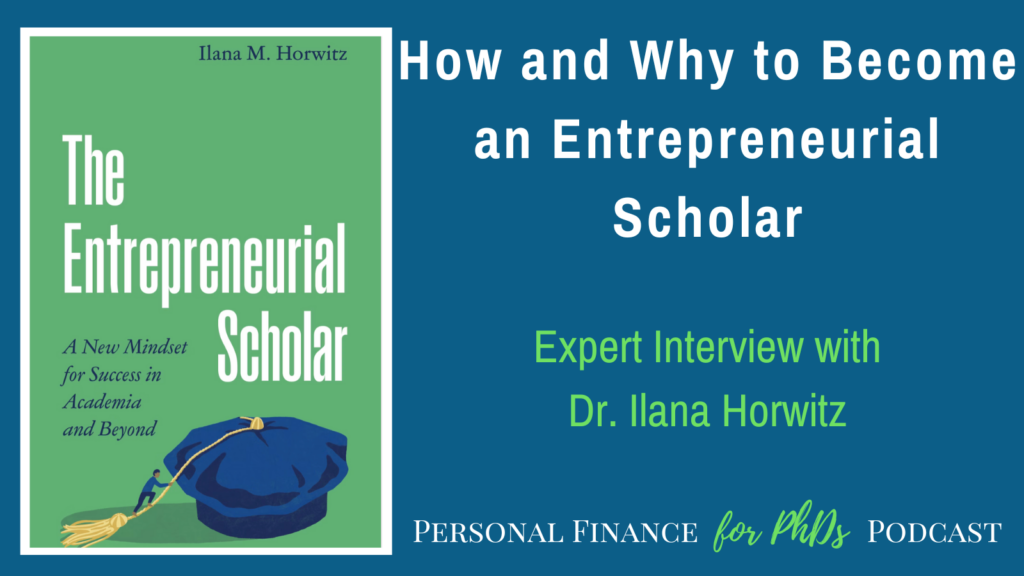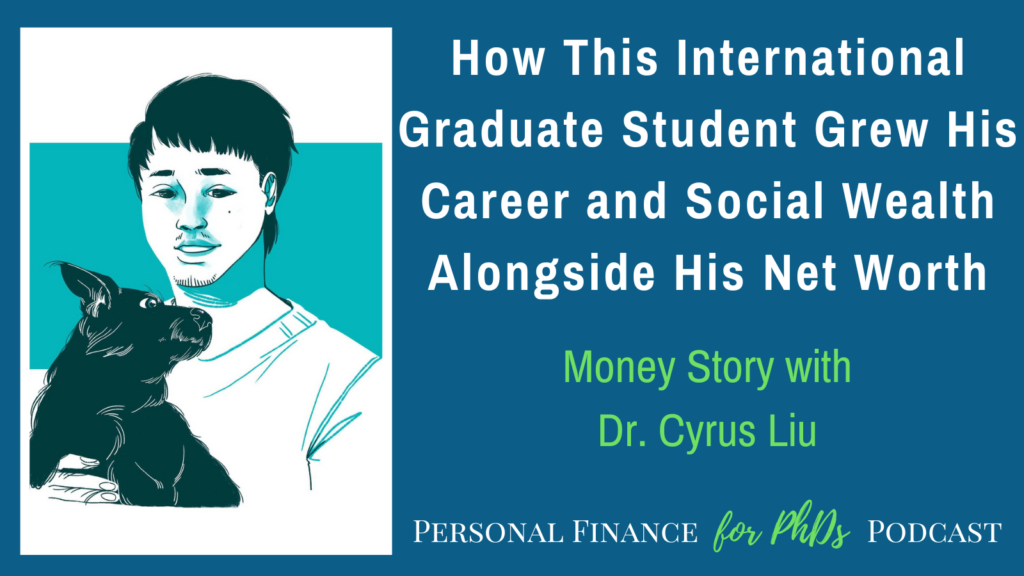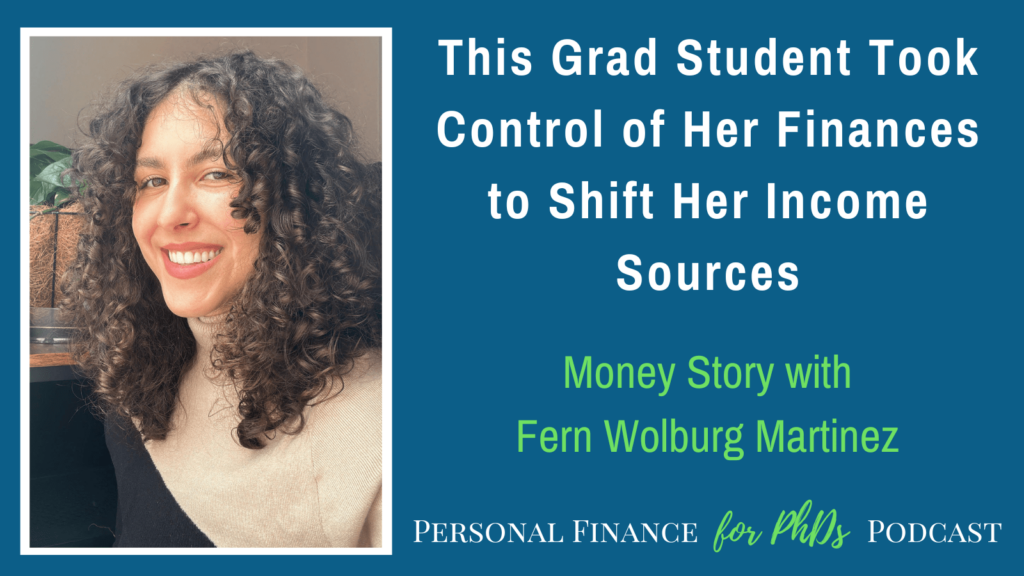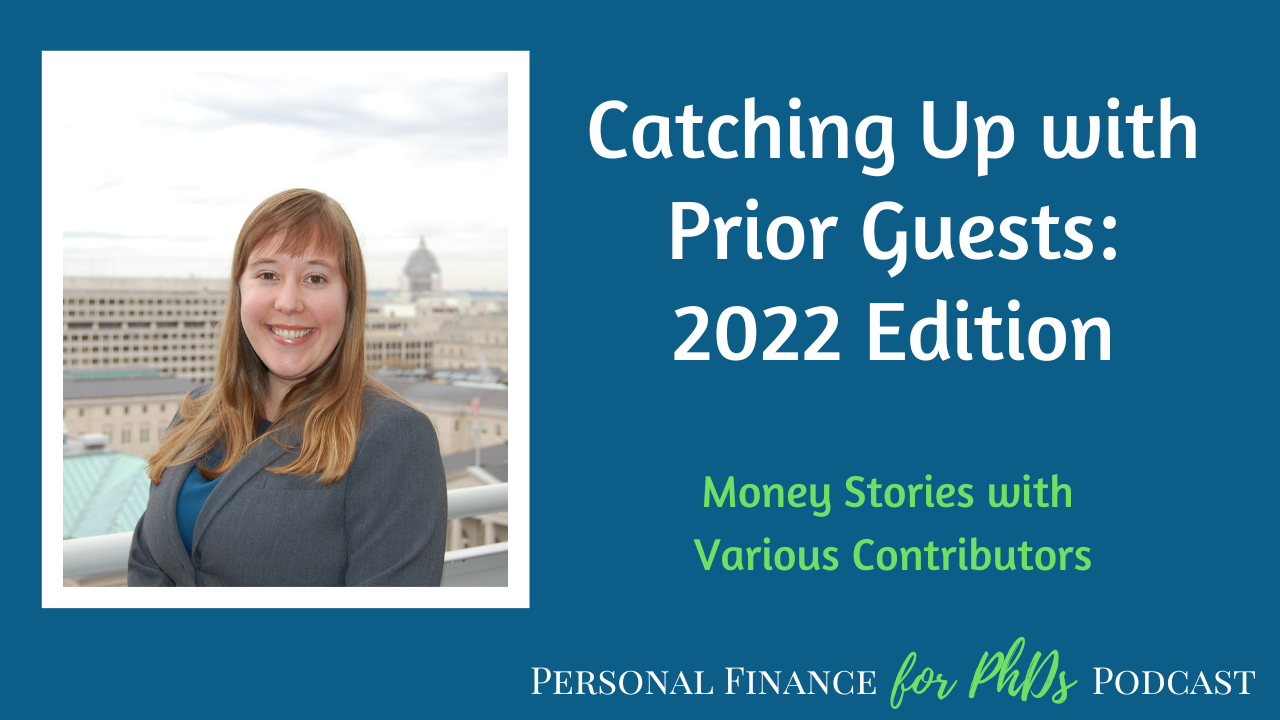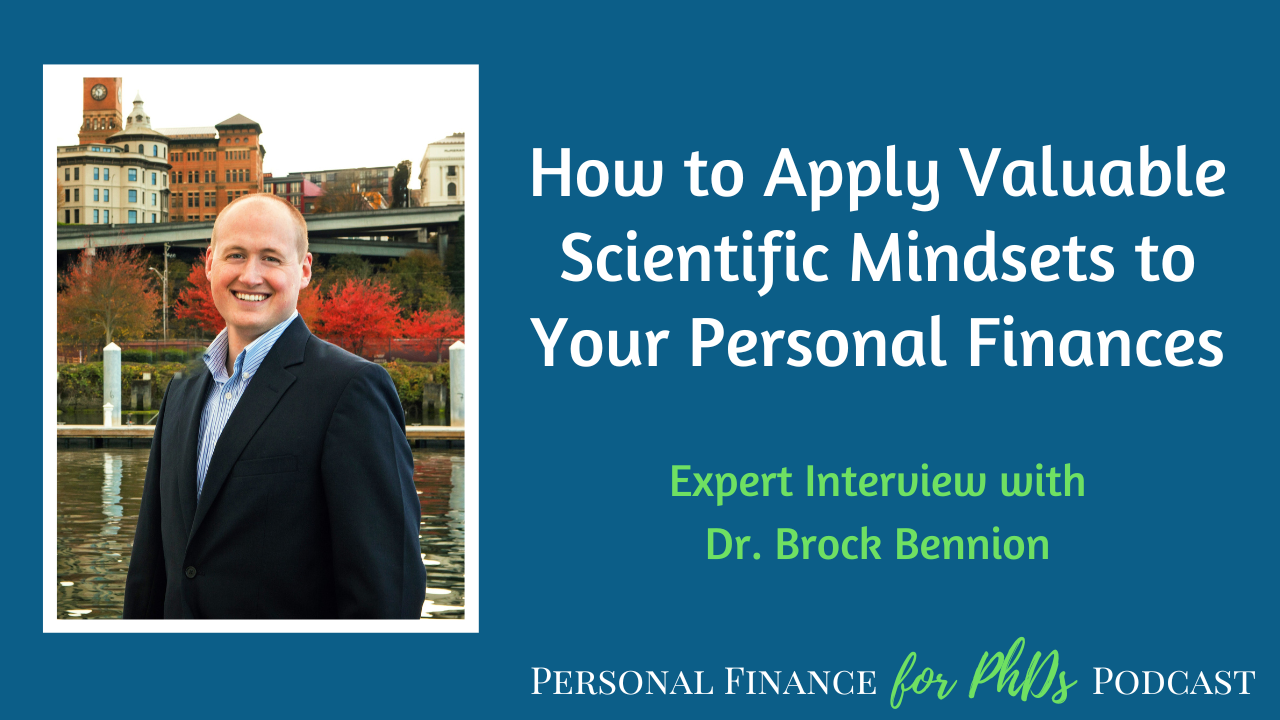In this episode, Emily presents five suggestions for reducing financial anxiety that you could use alongside your general anxiety management strategies. These five suggestions are designed to be used by graduate students, postdocs, and PhDs who are in objectively stressful financial situations. They include choosing just one financial goal, taking a small step, creating a recurring appointment, thinking through the worst case scenario, and talking with others.
Links mentioned in the Episode
- Host a PF for PhDs Seminar at Your Institution
- New PF for PhDs Workshop: Create Your Financial Emergency Response Plan
- Anxiety definition from the American Psychological Association
- Healthline: Money Anxiety Is Common, But You Don’t Have to Handle It Alone
- Emily’s E-mail Address
- PF for PhDs Subscribe to Mailing List
- PF for PhDs Podcast Hub
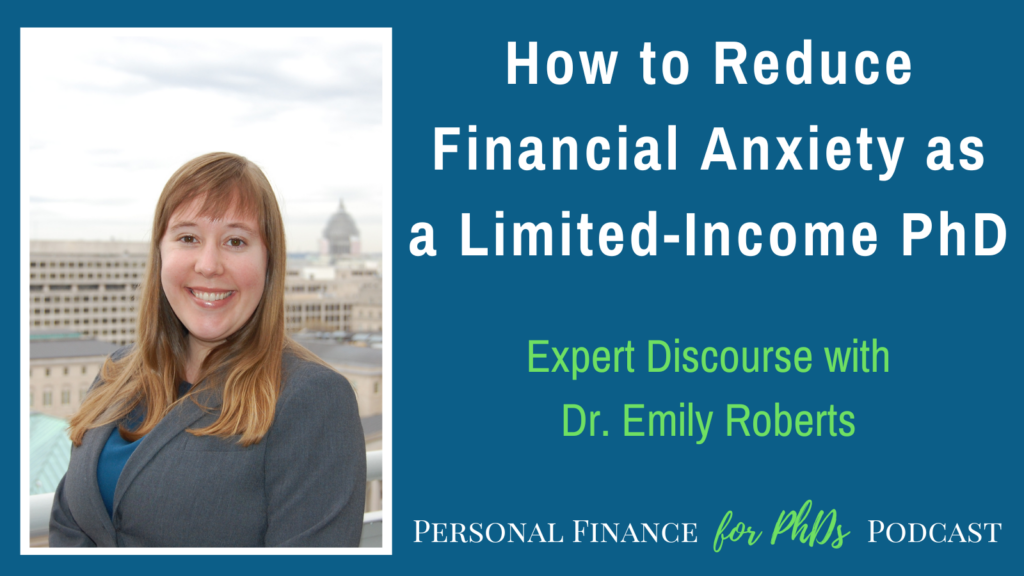
Introduction
Welcome to the Personal Finance for PhDs Podcast: A Higher Education in Personal Finance. This podcast is for PhDs and PhDs-to-be who want to explore the hidden curriculum of finances to learn the best practices for money management, career advancement, and advocacy for yourself and others. I’m your host, Dr. Emily Roberts, a financial educator specializing in early-career PhDs and founder of Personal Finance for PhDs.
This is Season 21, Episode 1, and today is a solo episode from me with five suggestions for reducing financial anxiety that you could use alongside your general anxiety management strategies. These five suggestions are designed to be used by graduate students, postdocs, and PhDs who are in objectively stressful financial situations. They include choosing just one financial goal, taking a small step, creating a recurring appointment, thinking through the worst case scenario, and talking with others.
I recently created a new workshop, the topic of which dovetails pretty nicely with this episode. The title is Create Your Financial Emergency Response Plan. As the name implies, during the workshop, I guide you through creating a plan for handling the type of financial emergency you’re most likely to encounter at the moment, which is the loss of your primary income. The idea is to really think through the resources that you would rely on if your grant gets cancelled, your funding runs out, you’re laid off, or you can’t land a job as quickly as you expected. Then, you’ll decide what steps you can take in the immediate future to bolster your plan’s likelihood of success. I piloted this workshop with subscribers to my mailing list, and it was very well received. I’m offering this workshop in two formats. The first is as a live workshop for university clients, so if you’d like to learn more about that you can go to PFforPhDs.com/financial-education/. I would really appreciate you recommending the workshop to an appropriate host at your institution. The second is as a pre-recorded workshop for individuals. You can read more details about this option and purchase it via PFforPhDs.com/financialemergency/.
If you perceive that there’s a reasonable chance that you might lose of your primary income in the next year or so, I hope that you will find a way to take this workshop, either via your institution or individually, so that you can create your plan and experience a bit of relief from the financial anxiety and stress that our academic and research community is currently experiencing. You can find the show notes for this episode at PFforPhDs.com/s21e1/. Without further ado, here’s my solo episode on reducing financial anxiety.
Disclaimer
I have to get this out of the way up front: I’m not a psychologist or anything similar—my PhD is in engineering—so the strategies I’m sharing with you today don’t necessarily have a medical or clinical basis or backing. Also I personally am not a generally anxious person and I’ve never sought treatment for anxiety or anything like that. I have experienced financial anxiety and financial stress at times, particularly when I was in graduate school, because money is obviously important to me and objectively that was a financially challenging time, and I did become too preoccupied with it for a while. However, I’m more so coming to this topic from my position as a financial educator, someone who is thoughtful about finances, reads and listens widely, and talks with people. And I have noticed that many people in our PhD community experience some degree of financial anxiety as well as financial stress.
What Is Financial Anxiety?
One conversation in particular inspired this episode. This past spring, I gave away a bunch of one-on-one money coaching sessions as part of my Giveaway Spring initiative. One of those coachees, a graduate student, came to me with the chief question, “How do I reduce my financial anxiety?” The person shared that they also experience climate anxiety and had found a body of suggestions for reducing it that were helpful, and so were looking for something similar in the financial realm.
I thought this was a fantastic question, but I wasn’t very well-prepared to answer it during that coaching session. I did make a couple of suggestions and gave a podcast recommendation, but promised to look into the topic further. This podcast episode is my follow-up for that coachee and all of you.
Let’s start off with a definition of financial anxiety, because it is distinct from stress, and I want to at least try to not conflate the two.
I pulled this definition of anxiety from the American Psychological Association’s website: “Anxiety is an emotion characterized by feelings of tension, worried thoughts, and physical changes like increased blood pressure. Anxiety is not the same as fear, but they are often used interchangeably. Anxiety is considered a future-oriented, long-acting response broadly focused on a diffuse threat, whereas fear is an appropriate, present-oriented, and short-lived response to a clearly identifiable and specific threat” (https://www.apa.org/topics/anxiety).
Furthermore, I pulled this summary of financial anxiety from an article from Healthline: “Money anxiety, in basic terms, happens when you worry about your income or fear something bad could happen with your finances. To put it another way, it’s an emotional response to your financial situation… A few signs your anxiety around money is becoming a more serious concern are aches and pains, avoidance, analysis paralysis, no work-life balance, rigidity, rumination, and trouble sleeping” (https://www.healthline.com/health/anxiety/money-anxiety#signs).
If you are experiencing financial anxiety, you should put into practice general anxiety-reducing advice to the extent of your ability, things like getting enough sleep, eating well, exercise, meditation and mindfulness, etc. You should also consider therapy, if that is accessible to you, such as through your university. In this episode, I’m going to focus on ideas for reducing anxiety long-term that are more specific to your finances. These strategies are ones that I pointed to during that coaching session and that I teach in my workshops. I’m going to avoid strategies that will primarily reduce your financial stress, like earning more or spending less, to focus more on the anxiety reduction. Of course, not all these strategies may work for you since anxiety is caused by and manifests differently in everyone.
Suggestion #1: Choose Just One Financial Goal to Work on at a Time
Here’s something I like to say in my financial goals workshop: There are a lot of good things you could be doing with your money. When you’re living on a limited grad student stipend or postdoc salary, you can’t work on all of them at once. You have to pick and choose the most optimal single goal. When you focus all of your available savings rate on just one goal at a time, you make relatively quick progress, which helps you to stay motivated and even get creative about how you might reach your goal even faster. When you split your available savings rate across multiple goals, you make slow or even imperceptible progress toward all of them, which can be very demotivating, and you’re more likely to abandon your plan.
How I think this principle can help with anxiety is that you give yourself permission to set aside all of your potential priorities save for the single one you’ve decided to work toward in the present. Instead of spinning your wheels in your mind telling yourself that you should be addressing every single aspect of your financial life or potential financial life, you can feel calm and settled that you are working toward the one most important thing you should be doing at the moment. The rest can wait until later.
In my workshops, I teach a financial framework that guides you in selecting that singular goal that’s most appropriate for you at any given time. I get a lot of questions like should I repay my student loans while they’re in deferment or start to invest? Should I save up cash or pay down my credit card debt? The framework answers those questions. If you can accept that it’s best to work on just one goal at a time and have confidence that you’ve chosen the most optimal goal to work toward, hopefully your mind can rest easier that you’re doing everything you need to right now and that those other goals will be addressed when the time is right.
While I can’t present my whole financial framework in this podcast episode, I will get you started on it: Step 1 is to create a starter emergency fund in a separate, named, high-yield savings account. Previously, in normal times, I suggested a starter emergency fund size of $1,000 to two months of expenses. Since academia and research are currently under attack in the US, I’ve revised the target size for the starter emergency fund to three months of expenses.
The good thing about having a target for this goal is that there is a defined end point. I have actually seen a tendency to over-save among some PhD trainees, and that is potentially financial anxiety manifesting itself. Having an emergency fund is vital, but there are other great financial goals to work toward as well, namely steps 2 through 8 of my framework, so it’s important to move on once you’ve fulfilled the first step. Excess savings are not actually serving any practical function for most people most of the time.
Suggestion #2: Take Just One Small Step
Related to that first suggestion of picking just a single goal, even a goal can be too overwhelming sometimes. For example, Step 2 of my framework is to pay off all high-priority debt, which includes credit card debt, IRS debt, and high interest rate debt. That’s a lot! So you really have to break it down further to make it manageable; it’s still far too intimidating as a group of debts.
Pick just one of these various debts that you want to work on first. Let’s say it’s a credit card balance. Break it down even further. What’s the one very first smallest step you can take to start to clear this debt? Maybe you could set up autopay on that card for more than the minimum, unsave the card from your online shopping portals and wallets, or eliminate one recurring expense so you can shift the money over to repaying the debt. Maybe you need to simply log in to the account and look at the balance if you’ve been avoiding that! Choose something readily accomplishable in just a few minutes.
Taking that very first small step might help to alleviate some anxiety because you are starting to take appropriate action. Again, you don’t have to do everything all at once, and in fact trying to tackle everything simultaneously can be counterproductive. Don’t beat yourself up about not going from A to Z immediately. It’s better to take one small step and then another than to stay stuck at the starting line.
Commercial
Emily here for a brief interlude. Would you like to learn directly from me on a personal finance topic, such as taxes, goal-setting, investing, frugality, increasing income, or student loans, each tailored specifically for graduate students and postdocs? I offer seminars and workshops on these topics and more in a variety of formats, and I’m now booking for the 2025-2026 academic year. If you would like to bring my content to your institution, would you please recommend me as a speaker or facilitator to your university, graduate school, graduate student association, medical school, postdoc office, or postdoc association? My workshops are usually slated as professional development or personal wellness. Orientations, postdoc appreciation week, or close to the start of the academic year would be a perfect time for tax education or general personal finance content. Ask the potential host to go to PFforPhDs.com/financial-education/ or simply email me at [email protected] to start the process. I really appreciate these recommendations, which are the best way for me to start a conversation with a potential host. The paid work I do with universities and institutions enables me to keep producing this podcast and all my other free resources. Thank you in advance if you decide to issue a recommendation! Now back to our interview.
Suggestion #3: Create a Recurring Appointment with Your Finances
My next suggestion is one that I came up with spontaneously during the coaching session that I mentioned, and it’s a variation on a commonly recommended tactic. The idea is to create a recurring appointment to address your finances, perhaps 30 to 60 minutes 2 to 4 times per month. In a couple, this is often referred to as a money date, but I think it would work very well for a person managing financial anxiety, whether single or coupled, and that’s how I’ll speak about it now.
During your money appointment, you should run through a few potential action items.
1) What do I need to decide regarding my finances? This is your time to think through and possibly research decisions you need to make. Maybe you want to open a new type of account and you’ll use this time to review your options. Maybe you have an upcoming spending opportunity and you need to figure out whether it’s possible and how you’ll pay for it. Updating your budget is a type of decision as well.
2) What do I need to do regarding my finances? This might involve carrying out a decision you just made or made previously. It probably involves minor recurrings tasks, like recording your net worth, updating your tracked expenses and comparing them to your budget, or manually paying a bill.
3) What do I need to learn regarding my finances? I think that you should make financial education a regular part of your life, and you might devote a portion of each appointment to it. Perhaps you can read a book in installments, listen to a podcast episode, or catch up on a financial creator’s social media content. This learning could be targeted to a certain topic you want to bone up on or be general.
4) What do I need to celebrate regarding my finances? Take some time to acknowledge when you’ve accomplished a goal or reached a milestone. Your celebration might just be an internal “good job!” during your appointment, or you could commit to a more visible celebration, like treating yourself or sharing your good news with a family member or friend.
What this strategy, when practiced regularly, could do for your anxiety is two-fold:
First, you will do things within your finances. Because of the regular attention you’re giving your financial decisions and tasks, your to-do list will get whittled down and you will make positive strides. It can help you get out of the procrastination-perfectionism cycle that is so common among PhDs. After a while, you start to trust yourself that you are appropriately handling your money—because you are! This can reduce anxiety in some cases.
Second, with this meeting, you have created a time container for your financial energy, whether that’s positive energy or negative. When you start to experience more acute financial anxiety, part of how you can alleviate it is to tell yourself that you will think about and/or deal with the matter during your next appointment. You can even keep a running agenda so items don’t slip through the cracks. You might also want to limit your consumption of financial content, like this podcast, to this appointment window only. This can help you calm your mind outside of those meeting times so you aren’t ruminating 24/7 about financial matters. You have already marked on your calendar when you’re going to address it so you can have confidence that it will be addressed at the appropriate time.
One final tip: Occasionally, you may need to call or chat with a financial institution during business hours. So, while your regular appointment time does not need to be during business hours, it might be helpful to identify a secondary time that falls within that window that you can use for that purpose when necessary.
Suggestion #4: Think Through the Worst Case Scenario
During another recent coaching session, not specifically related to financial anxiety, the coachee shared with me that they had an impulse to hold on to grant money they received and not spend it on research. Their reasoning was that they could keep the money in reserve for future research expenses in case they never won another grant. However, they had already told me during the session that in the past spending grant money on research expenses produced results that, as you would expect, made their subsequent grant applications stronger.
So I asked that coachee, “Well, let’s say that your worst-case scenario came to pass and you never won another grant. What would happen? Would you still be able to finish your PhD?” We talked through that for a few minutes, and the coachee realized that they had ways to pivot if they didn’t get any more grants and that the proper course of action would be to spend the already received grant money instead of holding onto it.
The coachee had been held up by this decision about what to do with the grant money for some time before we met. Yet all that really needed to happen was to face the dragon, so to speak. Once they looked the dragon of not winning another grant full in the face, they realized that it wasn’t so scary and was in fact manageable.
Other scary potential scenarios that might cause anxiety could be funding being cut off or running out, a soft job market in your chosen field, rising cost of living, or a personal or familial emergency.
Now, realizing that the scenario is manageable is not always going to be the outcome when you decide to address the source of your financial anxiety or stress. However, I think often it is the case that you’ll feel better having fully faced the possible worst case scenario rather than trying not to think about it.
I saw this with the pilot version of Create Your Financial Emergency Response Plan. I asked participants to self-report their financial anxiety on a scale of 1 to 5 at the beginning and end of the workshop, and they reported a 1-point reduction over that span of time. What we did, in part, was face up to the possibility that the participants could lose their primary incomes and created a plan for what resources to draw upon if that happened. The participants left the workshop with a few next steps to carry out or research to increase the chance of their plan successfully helping them navigate a loss of income.
Suggestion #5: Talk with Other People about Money
The last option I’ll put forward for reducing your financial anxiety is to talk with other people about money generally or your financial anxiety in particular. It can really help to know that you’re not alone in your struggles, stress, and anxiety. In fact, these coachees that I’ve been mentioning were taking this exact step when they signed up for a session with me, and several of them spontaneously expressed at the end of our time how much it had helped them emotionally just to talk and hear from me.
Of course, financial coaching isn’t the only way you can accomplish this. You can broach the topic with a friend or family member. Polling shows that financial stress and anxiety are very common among Americans generally, and I have to imagine it’s only increased in our current financially uncertain times. It may help to speak with someone who knows more intimately what’s going on right now in academia and research, like a friend who’s also a peer. I certainly found it easier to talk about money with my fellow grad students back when I was in that stage of life because I knew all of our incomes were within a tight range so we could all relate to one another.
If even speaking with a friend is too much, going back to the small step suggestion, perhaps consume some public financial content. Not if it worsens your anxiety of course, but if you find it helpful. You already know about this podcast. Another podcast that might help is called Money Feels, and I would suggest in particular the early episodes, where they speak often about money trauma. Again, you might find that particular podcast helpful or super not helpful, but there are lots of financial content creators out there on every platform for you to choose among.
That’s it from me for this episode! I hope that if you are experiencing financial anxiety that you will try out one of these suggestions alongside your other general management strategies. If you do, please let me know how it goes!
Outro
Listeners, thank you for joining me for this episode! I have a gift for you! You know that final question I ask of all my guests regarding their best financial advice? My team has collected short summaries of all the answers ever given on the podcast into a document that is updated with each new episode release. You can gain access to it by registering for my mailing list at PFforPhDs.com/advice/. Would you like to access transcripts or videos of each episode? I link the show notes for each episode from PFforPhDs.com/podcast/. See you in the next episode, and remember: You don’t have to have a PhD to succeed with personal finance… but it helps! Nothing you hear on this podcast should be taken as financial, tax, or legal advice for any individual. The music is “Stages of Awakening” by Podington Bear from the Free Music Archive and is shared under CC by NC. Podcast editing by me and show notes creation by Dr. Jill Hoffman.
